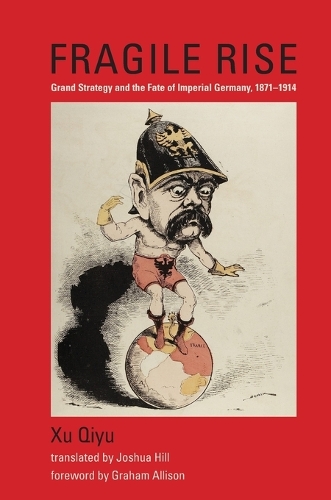
Fragile Rise: Grand Strategy and the Fate of Imperial Germany, 18711914
(Paperback)
Available Formats
Publishing Details
Fragile Rise: Grand Strategy and the Fate of Imperial Germany, 18711914
By (Author) Xu Qiyu
Foreword by Graham Allison
Translated by Joshua Hill
MIT Press Ltd
MIT Press
31st October 2023
United States
Classifications
Professional and Scholarly
Non Fiction
International relations
Central / national / federal government policies
Colonialism and imperialism
355.033543
Physical Properties
Paperback
368
Width 156mm, Height 235mm
369g
Description
A series of solemn anniversary events have marked the centenary of World War I. Could history repeat itself in today's geopolitics Now, as then, a land power with a growing economy and a maritime power with global commitments are the two leading states in the international system. Most ominously, the outbreak of war in 1914 is a stark reminder that nations cannot rely on economic interdependence and ongoing diplomacy to keep the peace. In Fragile Rise, Xu Qiyu offers a Chinese perspective on the course of German grand strategy in the decades before World War I. Xu shows how Germany's diplomatic blunders turned its growing power into a liability instead of an asset. Bismarck's successors provoked tension and conflict with the other European great powers. Germany's attempts to build a powerful navy alienated Britain. Fearing an assertive Germany, France and Russia formed an alliance, leaving the declining Austro-Hungarian Empire as Germany's only major ally. Xu's account demonstrates that better strategy and statesmanship could have made a difference-for Germany and Europe. His analysis offers important lessons for the leaders of China and other countries. Fragile Rise reminds us that the emergence of a new great power creates risks that can be managed only by adroit diplomats, including the leaders of the emerging power. In the twenty-first century, another great war may not be inevitable. Heeding the lessons of Fragile Rise could make it even less likely. Germany's rise to power before World War I from a Chinese persective, and the geopolitical lessons for today. A series of solemn anniversary events have marked the centenary of World War I. Could history repeat itself in today's geopolitics Now, as then, a land power with a growing economy and a maritime power with global commitments are the two leading states in the international system. Most ominously, the outbreak of war in 1914 is a stark reminder that nations cannot rely on economic interdependence and ongoing diplomacy to keep the peace. In Fragile Rise, Xu Qiyu offers a Chinese perspective on the course of German grand strategy in the decades before World War I. Xu shows how Germany's diplomatic blunders turned its growing power into a liability instead of an asset. Bismarck's successors provoked tension and conflict with the other European great powers. Germany's attempts to build a powerful navy alienated Britain. Fearing an assertive Germany, France and Russia formed an alliance, leaving the declining Austro-Hungarian Empire as Germany's only major ally. Xu's account demonstrates that better strategy and statesmanship could have made a difference-for Germany and Europe. His analysis offers important lessons for the leaders of China and other countries. Fragile Rise reminds us that the emergence of a new great power creates risks that can be managed only by adroit diplomats, including the leaders of the emerging power. In the twenty-first century, another great war may not be inevitable. Heeding the lessons of Fragile Rise could make it even less likely.
Author Bio
Xu Qiyu is Deputy Director of the Institute for Strategic Studies at National Defense University in Beijing. Graham Allison is Douglas Dillon Professor of Government and Director of the Belfer Center for Science and International Affairs at the Harvard Kennedy School.
